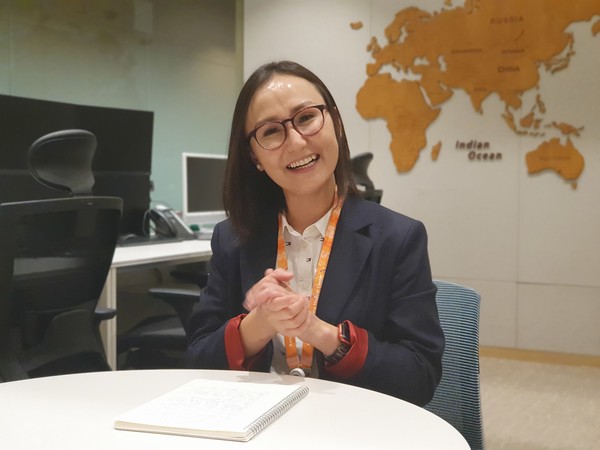Kangbuk Samsung Hospital has been running the Mongolia National Diagnostic Treatment Center (NDTC) Operation Management Consulting Project since July 2020 to provide training for Mongolian physicians.
This year, the training was conducted for medical staff in charge of diagnostic medicine, nursing, nuclear medicine and hospital information system.

“Thanks to this training programme, our hospital can now offer certified PET-CT services to Mongolian citizens nationwide without having to search abroad for these services,” said Mongolian representative, Dorjkhand Khurelbaatar, as she expressed her gratitude to both Korea Foundation for International Healthcare (KOFIH) and Kangbuk Samsung Hospital on Tuesday at the end of the programme.
The programme aims to improve Mongolia's healthcare regarding safety management of nuclear medical facilities at the NTDC, on-site education to strengthen medical manpower, nursing training, invitation training, and online advice.
The most recent program ran for three-weeks from Sept. 14 to Oct. 5 and Korea Biomedical Review visited Kangbuk Samsung Hospital on Tuesday to get the thoughts of the Mongolian delegate from the Mongolian NDTC.
The next training period scheduled later this year will include seven more professionals and the fields of expertise can vary depending on the needs of the trainee, said a Kangbuk Samsung hospital official.
One of the invited guests, Khurelbaatar, who has 12 years of experience as a specialist in laboratory medicine, spoke on behalf of the Mongolian team. This NTDC, which was established in 2019, is located in one of Mongolia’s biggest tertiary level hospitals which has a 90-year history. As the lab equipment at this Mongolian center was recently upgraded to modern, advanced technology, she said that this training programme was essential to improve their knowledge on the operation of newer technologies at Kangbuk Samsung hospital’s fully automated lab facilities.
Khurelbaatar explained a little bit about the structure of the programme which was conducted in Korean. However, as the program was a customized one-on-one experience, each participant was designated a translator to ensure they fully understand the training contents, she elaborated. “Before coming to Korea, I submitted a study plan and the hospital’s project team developed that plan into a tailored curriculum for three weeks.”
Overall, she expressed her satisfaction with the programme saying it exceeded her expectations as it covered everything she had requested in the study plan, with additional course material.
“Although the time flew by, I think this period is sufficient to accomplish the learning objectives of the programme.” Khurelbaatar stated.
Among the topics taught were external and internal quality control which is important to ensure accurate and reliable results with opportunities to learn how to solve some common errors encountered in the lab, she said.
A typical day for Khurelbaatar in Mongolia consists of performing clinical biochemistry tests which first starts by checking all equipment for quality control before performing tests, and participating in training programs or checking lab results in the evening.
As the hospital’s equipment are fully automated, it helps to streamline the technicians’ workflow in the laboratory and improve work performance so it was great to learn from this environment, she said. Aside from the training program, she also expressed her gratitude that the Samsung team organized trips for them to visit some tourist sites in Busan and Seoul as it was her first-time visiting Korea.
“Throughout this programme, we each studied in our respective departments, and developed action plans including short mid and long-term goals based on the training received.” said Khurelbaatar, “Furthermore, we created more specific plans for each goal which will be conducted this year and next year, with a report to be subsequently submitted to the Samsung hospital team upon completion.”
She mentioned that improving quality of lab tests as a short-term goal with mid- long-term plans to improve human resource of lab technicians through training programs so they could collect more blood samples from outpatients and thus improve the laboratory’s total working capacity.
On this note, she added, “Our institution aims to provide qualified treatment and diagnosis to everyone in Mongolia, as one of the three tertiary-level hospitals.”
When asked how this center distinguishes itself from others in Mongolia, she replied, “Among the new equipment received, our center is the only one that has a PET CT machine to perform nuclear diagnosis which is essential for special cancer examination and treatment.”
This is very fortunate, she said, as cancer patients are on the rise and before had to go abroad to receive this kind of treatment. Moreover, it is also included in the national health insurance plan, she remarked.
Expressing her final thoughts on the programme, she said that this programme instigated her to want to pursue other study programs as the medical field is constantly evolving and therefore, these programs are essential to stay updated.
“I would like to participate in a programme like this again but I think it is better to give others a chance to directly experience the advanced technology hospital environment in Korea but I am looking forward to transferring my knowledge to others through my action plan when I return home,” said the medical laboratory specialist.

